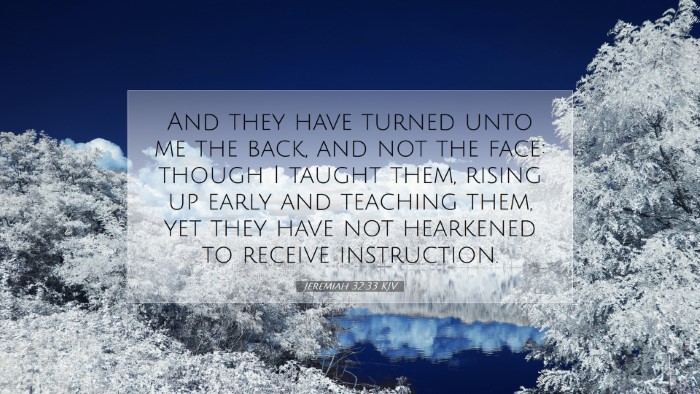Commentary on Jeremiah 32:33
Jeremiah 32:33 states, "And they have turned unto me the back, and not the face: though I taught them, rising up early and teaching them, yet they have not hearkened to receive instruction."
Contextual Overview
This verse encapsulates the divine lament over the persistent apostasy of Judah. As Jeremiah, the weeping prophet, communicates the message of God, we perceive a profound sadness over the people's response to divine instruction. The historical backdrop includes the impending Babylonian invasion, symbolizing divine judgment and the consequences of disobedience.
Insights from Commentaries
Matthew Henry's Commentary
Matthew Henry emphasizes the continual grace and mercy of God in His efforts to teach His people. Despite their refusal to heed His instructions, the Lord remained patient and forgiving. Henry points out that God's "rising up early" suggests His persistent initiative in guiding His people, akin to a devoted teacher who tirelessly seeks to educate.
He asserts that their unwillingness to turn their faces toward God signifies a rejection not merely of His commandments but of the relationship that those commandments foster. The back turned toward God is a metaphor for a heart that has become estranged from its Creator, highlighting a profound spiritual malaise.
Albert Barnes' Commentary
Albert Barnes provides a detailed analysis of the phrase "they have turned unto me the back." He posits that this reflects a willful choice to reject God’s terms of love and faithfulness. Barnes explains the significance of repentance, which requires a turning toward God — an act of faith that acknowledges our need for His guidance and mercy.
He also stresses that the teaching from God, which comes in various forms—through prophets, scriptures, and personal conscience—was met with obstinacy. Barnes notes that, despite the abundance of God’s instruction, the people’s refusal reveals the deep-rooted hardness of their hearts. This speaks to the necessity of a transformative act of the Holy Spirit to awaken the spiritually dead.
Adam Clarke's Commentary
Adam Clarke elaborates on the connotations of "teaching" in this verse, indicating that God’s instructions were not merely obligatory commands but acts of love meant to guide His people toward righteousness and life. He points out the duality in God’s nature: justice and mercy.
Clarke illustrates that when God “taught them,” it was not just a dissemination of knowledge but an invitation to a deeper fellowship with Him. He argues that the repeated rejections of divine guidance showcase humanity’s propensity for self-destruction and disavowal of God’s will. Clarke's observations compel us to ponder the grave implications of ignoring divine wisdom.
Theological Implications
This verse serves as a poignant reminder to contemporary believers of the consequences of spiritual neglect. The willingness of God to instruct contrasts sharply with the stubbornness of the human heart. The turning of the back indicates a complete disengagement from divine truths, and the absence of response to God’s teaching underscores the tragedy of missed opportunities for growth and redemption.
Practical Applications
- Encouragement for Pastors: This passage serves as a reminder of the importance of persistence in teaching and guiding congregants, much like God’s approach.
- For Students of the Word: The need for a receptive heart to the teachings of Scripture is emphasized, urging deep engagement rather than mere academic understanding.
- Theologians’ Insight: A deep dive into the nature of God’s pedagogical methods in Scripture reveals profound truths about grace, mercy, and human agency.
- For Bible Scholars: Analyzing the cultural and historical context of Jeremiah can yield valuable insights into modern-day applications of turning back toward God.
Conclusion
In conclusion, Jeremiah 32:33 reveals rich theological and pastoral insights into the nature of God’s communication with humanity. The juxtaposition of God’s faithful instruction against human rebellion presents an important narrative about divine love meeting human resistance. Understanding and applying these truths could lead to transformative effects within personal lives and congregational settings. Therefore, let this verse invite serious contemplation regarding our responses to God’s instructions and our willingness to turn our faces toward Him.


